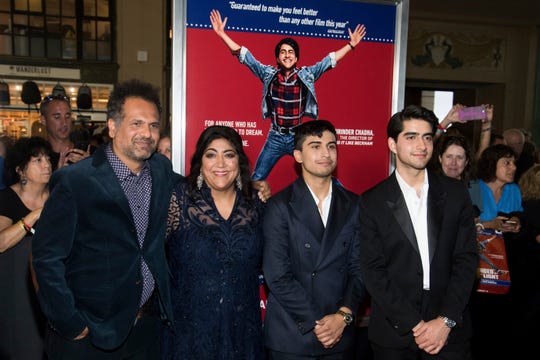By Kanishkaa Balachandran/The Hindu
“Having stumbled in the dark for so long, on that September night, I was blinded by the light. That night Bruce Springsteen changed my life.”
The above is an extract from Greetings from Bury Park (Bloomsbury, 2007), the memoir of British journalist and broadcaster Sarfraz Manzoor.
It was the autumn of 1987, and the life of a 16-year-old boy of Pakistani origin, living in Luton, was about to change. A chance meeting in school with a Sikh boy, Amolak, was just the start of Manzoor’s transformative journey.
Springsteen’s heartfelt lyrics about life’s hardships and complicated relationship with his father resonated with Manzoor’s own personal battles. The bubble-gum ’80s pop that was trending made little sense. For Manzoor, “The Boss” Springsteen was escapism.
Manzoor’s work is the subject of director Gurinder Chadha’s Blinded by the Light, (named after one of Springsteen’s early hits) which just had its theatrical release in the UK and the US.
Significantly, the film has the blessings of Springsteen himself, who authorized the use of 12 of his songs, including ‘Dancing in the Dark’, ‘The Promised Land’, with AR Rahman providing the background score.
Twelve years ago, did Manzoor even remotely imagine that his memoir would materialize into a film? “The truth is I did,” Manzoor tells MetroPlus over Skype from London.
“I knew Gurinder personally. When I was writing the book, I thought it would be incredible if I could persuade her to adapt my book. It wasn’t guaranteed, but I did have that fantasy.”
The idea appealed to Gurinder, but since his memoir followed a non-linear storytelling, Gurinder suggested the script needed a narrower theme. Manzoor took inspiration from the film An Education (written by Nick Hornby), the true story of a teenage girl whose life changes when she meets an older man.
“I thought, hang on, my life too was transformed at 16 by an outsider,” he says.

Manzoor points to two contrasting life-altering moments that gave his fantasy the impetus it needed. The first was a chance meeting with Springsteen in London in 2010, when he heard that “The Boss” had already read his book. The second, however, was anything but euphoric. In 2012, with a young family to support, Manzoor’s writing contract with The Guardian was not renewed, leaving him in a “crushed emotional state”.
“My wife then suggested to me, why don’t you think of it as an opportunity? Now that I had no safety net I then decided to seriously commit myself to writing the screenplay,” he says.
In 2017, Manzoor sent the script to Springsteen and requested permission to use his original songs. The green signal set the ball rolling with the funding and filming.
British actor Viveik Kalra was cast as the protagonist Javed (also Manzoor’s middle name), a Pakistani immigrant who yearns to become a writer, treats Springsteen’s words as gospel in the face of repeated cross-generational battles with his authoritarian father and traditional family, as if they were in a parallel universe.
It sat well with Gurinder’s tried-and-tested formula as seen in similar Asian diaspora movies like Bend it like Beckham. She was given the creative license to fictionalize parts of the story, the romantic angle for instance.
“I provided the detail, dialogue and the humor and she was helping to make sure the structure was solid and hitting the right emotional beats,” says Manzoor.
Springsteen graced the movie premiere at the hallowed Asbury Park, New Jersey, recently, and over the course of nearly three decades, Manzoor has had to pinch himself repeatedly. Like at Wembley, in July 6, 1992, when Springsteen laid eyes on him, handing him his guitar while he changed his shirt. “Suddenly, Bruce started recognizing me and pointing and smiling at me and I thought ‘My God! He knows I exist’! A few days ago, a person tweeted to me saying “are you the same guy who held Bruce’s guitar when he changed his shirt?” he says, laughing.
What did Springsteen himself think of the movie? “I think he told Gurinder, ‘thank you for treating me so beautifully, don’t change a thing’,” he signs off.





























































